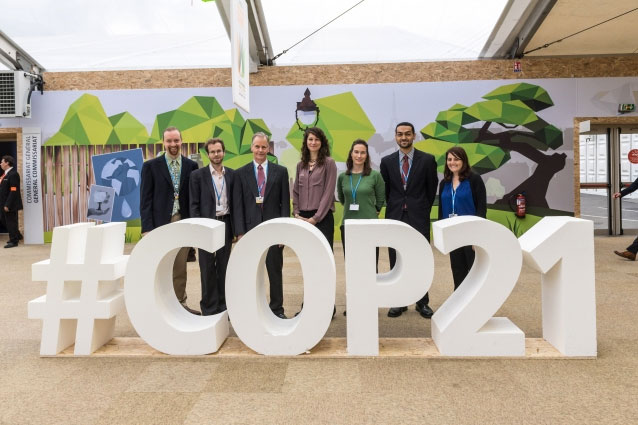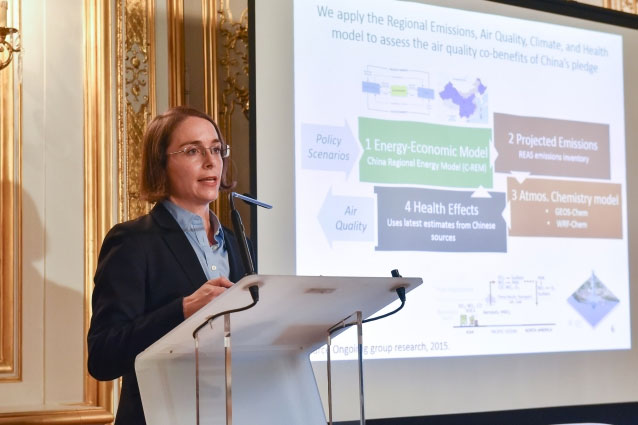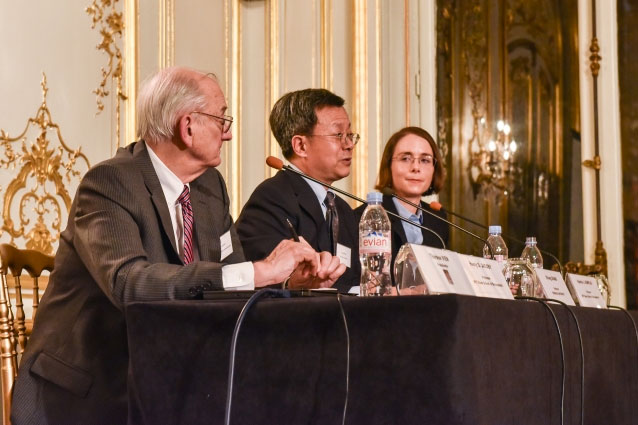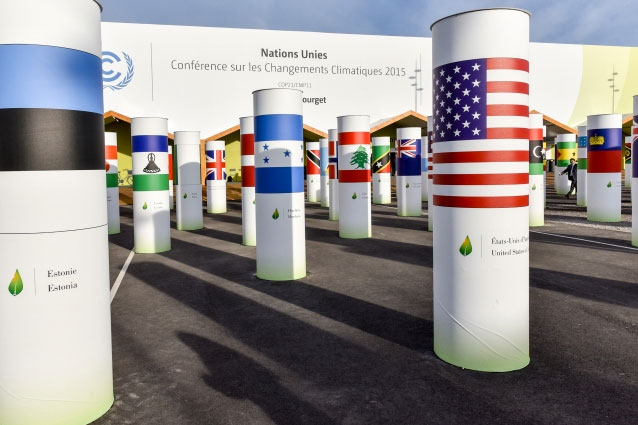
The MIT Energy Initiative (MITEI) is sharing updates on MIT activities at COP21 in Paris. For additional coverage of MIT’s COP21-related news and analysis, visit MITEI’s COP21 webpage.
“The world needs an aggressive but pragmatic transition from our current energy mix to a zero-carbon future,” said MIT Vice President for Research Maria Zuber on a panel during the United Nations Climate Change Conference (COP21) talks in Paris on Dec. 11. “It’s going to take industry, government, and academia working together to invent our way forward, and to provide policy incentives to adopt promising technologies.” (See video)
This sentiment has rung true throughout COP21, as members of the MIT community have held events to share climate and energy research with members of the public and the media from around the world, launch new international partnerships and initiatives for climate solutions, and discuss pathways towards a global low-carbon energy future.
Exploring China’s role in climate talks and global energy future
On Dec. 4, MIT Sloan School of Management professors Henry Jacoby and Valerie Karplus and their collaborator, professor Xiliang Zhang of Tsinghua University and the MIT-Tsinghua China Energy and Climate Project, gave a talk at the MIT Club of France in the historic France-Amériques building. Addressing an audience of COP21 attendees, MIT alumni, current students, and others, they discussed how China’s actions coming out of COP21 could help shape the future global energy system.
In a brief history of international climate negotiations, Jacoby described the shift from developed nations’ attempts to control greenhouse gas emissions to the current “pledge and review” process that is more inclusive of developing nations and takes their sustainable development needs into account.

Citing the 185 countries that have pledged indicated nationally determined contributions (INDCs) for COP21, Jacoby said, “There’s been real progress in spreading around the notion that everybody has some responsibility for this.”
Zhang, who introduced himself as the father of an MIT student, gave an overview China’s energy and climate policy to help further understanding of policy context for China’s COP21 pledge.
He reviewed policy mechanisms that have been helping China decrease energy intensity, including the legally binding targets for energy intensity that have been introduced for China’s major cities, industries, and companies, with monitoring for accountability and consequences if targets were not met. “This policy has been largely contributing to the energy intensity declining for the past eight years,” he said, noting that the provincial targets have been largely fulfilled, and adding, “We can see increased decoupling of economic growth and energy consumption.”
Karplus followed up by exploring the implications of China’s climate policies for its energy system and for air quality improvement — including its announced nationwide carbon trading regime. She and Professor Noelle Selin, both faculty affiliates of the MIT Joint Program on the Science and Policy of Global Change, and their research teams have developed a model that connects a model of China’s provincial energy economy with an air chemistry model to look at how changes in energy policy translate into changes in projected emissions and air quality impacts, and examine impacts on morbidity, mortality, and the economy. This analysis can also be used in other developing and emerging markets that are experiencing tension between environment and development goals.

“China needs a carbon price to ensure that actions to curb air pollution are consistent with climate mitigation goals,” said Karplus. “It has a unique opportunity to address climate change and air quality at the same time.”
In its joint climate agreement with the U.S., China has promised to increase its non-fossil fuel share of primary energy to 20 percent by 2030, and has also pledged to reduce carbon intensity by 60-65 percent by 2030 relative to 2005 levels. It has also made significant reforestation commitments.
Karplus added, “One new dynamic in Paris is the cooperation between China and the United States, built on the joint announcement of each country’s climate pledges in November 2014. Nobody is pointing fingers anymore, saying the other should act first. The focus has shifted to vital issues such as finalizing contributions, financing energy system transformation, and reviewing progress.”
To broaden the reach of the MIT-Tsinghua partnership’s model, Karplus’s team is building an interactive website that will allow people to explore China’s regional energy systems.
Event organizer Stephanie Ng ’01, head of innovation and director of cultural affairs for the MIT Club of France, said, “I am reminded of an inspiring conversation I shared with President Reif: We discussed how, at MIT, students come from across the globe, and what unites us is our common mission to solve the world’s greatest challenges. Nowhere is this more evident than here at COP21, where faculty and alumni have come to the City of Light to illuminate us on climate mitigation goals and share a vision of the future of global energy.”
Calling for international collaboration
At COP21, others from MIT have also been underscoring the importance of rapid decarbonization of energy systems. In a packed press conference on Dec. 3, alongside other leading climate scientists, MIT professor Kerry Emanuel challenged world leaders to fully decarbonize the world economy by employing all available sustainable energy sources, including renewable energy and nuclear energy. Emanuel and fellow scientists James Hansen of the Columbia University Earth Institute, Tom Wigley of the University of Adelaide and the National Center for Atmospheric Research, and Ken Caldeira of the Carnegie Institution for Science, outlined how only a combined strategy employing all major sustainable energy options can prevent the worst impacts of climate change by 2100.
In an open letter in The Guardian that ran on the same day, they argued: “Nuclear power, particularly next-generation nuclear power with a closed fuel cycle (where spent fuel is reprocessed), is uniquely scalable, and environmentally advantageous.”
At the launch of a new Climate CoLab partnership with the UN Secretary-General at COP21 to strengthen vulnerable nations’ resilience to climate change, MIT Professor and CoLab director Thomas Malone spoke to the importance of broadly engaging people on numerous solutions. “No matter the outcome of the international climate negotiations, it is clear that now more than ever before, we need the ideas and contributions of as many people as possible to address climate change,” he said.
Laur Fisher of the Climate CoLab also presented at several events, including the Innovation Climate Accelerator’s Breakthrough Night during COP21, which showcased global projects that actively contribute to the realization of a post-carbon world. The CoLab also launched a partnership with Taiwan’s Environmental Protection Administration to help the region solicit ideas from the public to work on climate change issues that impact Taiwan.
One of the engaging, interactive side events of COP21 was the “World Climate” role-play led by Professor John Sterman and the nonprofit Climate Interactive, in which people from around the world took on roles as climate negotiators to experience the challenges of reaching strong, inclusive international agreements that limit temperature and sea level rise.
The panel on which Maria Zuber spoke was another event drawing on global perspectives, hosted by Delta Group, with members of European, Chinese, and Taiwanese industry and government. Following Zuber’s overview of the MIT Plan for Action on Climate Change, she and fellow panelists discussed the need to invest more resources globally in increasing energy efficiency across sectors, from the manufacturing industry to the built environment and power electronics.
Robert Stoner, MIT Energy Initiative deputy director and Tata Center for Technology and Design director, attended the Global Landscapes Forum during COP21. The forum featured economist and MIT alumna Ngozi Okonjo-Iweala PhD ’81, who has held positions including managing director of the World Bank and Nigerian minister of finance. Her message resonated with Stoner, who said, “Ngozi was characteristically clear-eyed as she emphasized the importance of massive investment in land restoration and water protection, combined with a sincere and effective response by governments to manage and enforce laws and regulations to help developing nations reduce their contribution to greenhouse emissions while protecting the livelihoods of their forest-dependent populations.”
Meanwhile, Professor Jessika E. Trancik of the Institute for Data, Systems, and Society (IDSS) shared her research with the White House, U.S. Department of Energy, and others — leading up to and during COP21 — on how nations’ INDCs could increase renewable energy adoption and drive down future deployment costs in a mutually reinforcing cycle. Policy makers referenced her work to show how making early, significant investments to reduce greenhouse gas emissions could make future mitigation efforts less costly.
Students and recent alumni witnessing history in the making
During the second week of COP21, MIT PhD candidates Michael Roy Davidson and Jessica Gordon, undergraduate student Joseff Kolman, and Ellen Czaika PhD ’15 were among those who participated as observers. In addition to watching the main negotiations, they have had the opportunity to attend other special events, including a briefing with U.S. EPA Administrator Gina McCarthy.

Czaika, who earned her PhD in September from the IDSS, has been sharing her experience of COP21 through webinars with Noelle Selin’s class, which has been studying and blogging about the climate talks. Czaika said she is “impressed by all of the work that has gone into this event: preparation on substantive issues, establishing procedural guidelines, facilitation and logistics, educational sessions, demonstrations, and communication.”
Davidson, an IDSS PhD candidate and researcher with the MIT-Tsinghua China Energy and Climate Project, has found the talks highly relevant to his work. “One of the key outcomes of Paris which we see increasing convergence on is to set up a regular review mechanism to encourage countries like the U.S. and China to ratchet up their ambition further to meet long-term climate stabilization goals,” he said.
Kolman has also found the experience exciting and rewarding: “It’s been interesting being in the middle of this busy little village of activity, with hundreds of observers from all corners of the world — each waiting to see what the negotiations yield,” he said. “It is clear that leaders here recognize the enormous threat of climate change, and the general consensus is that we’ll be moving forward from Le Bourget with an agreement. Now the question remains of how ambitious it will be.”
Update: On Dec. 12, at the conclusion of COP21, 195 nations signed an historic agreement to combat climate change and unleash actions and investment towards a low-carbon, resilient, and sustainable future. Read the United Nations announcement.
This article appears in the Spring 2016 issue of Energy Futures.